Proton VPN vs Privado VPN – which should you get for 2024
Both offer amazing free VPNs, but should you pick one over the other?
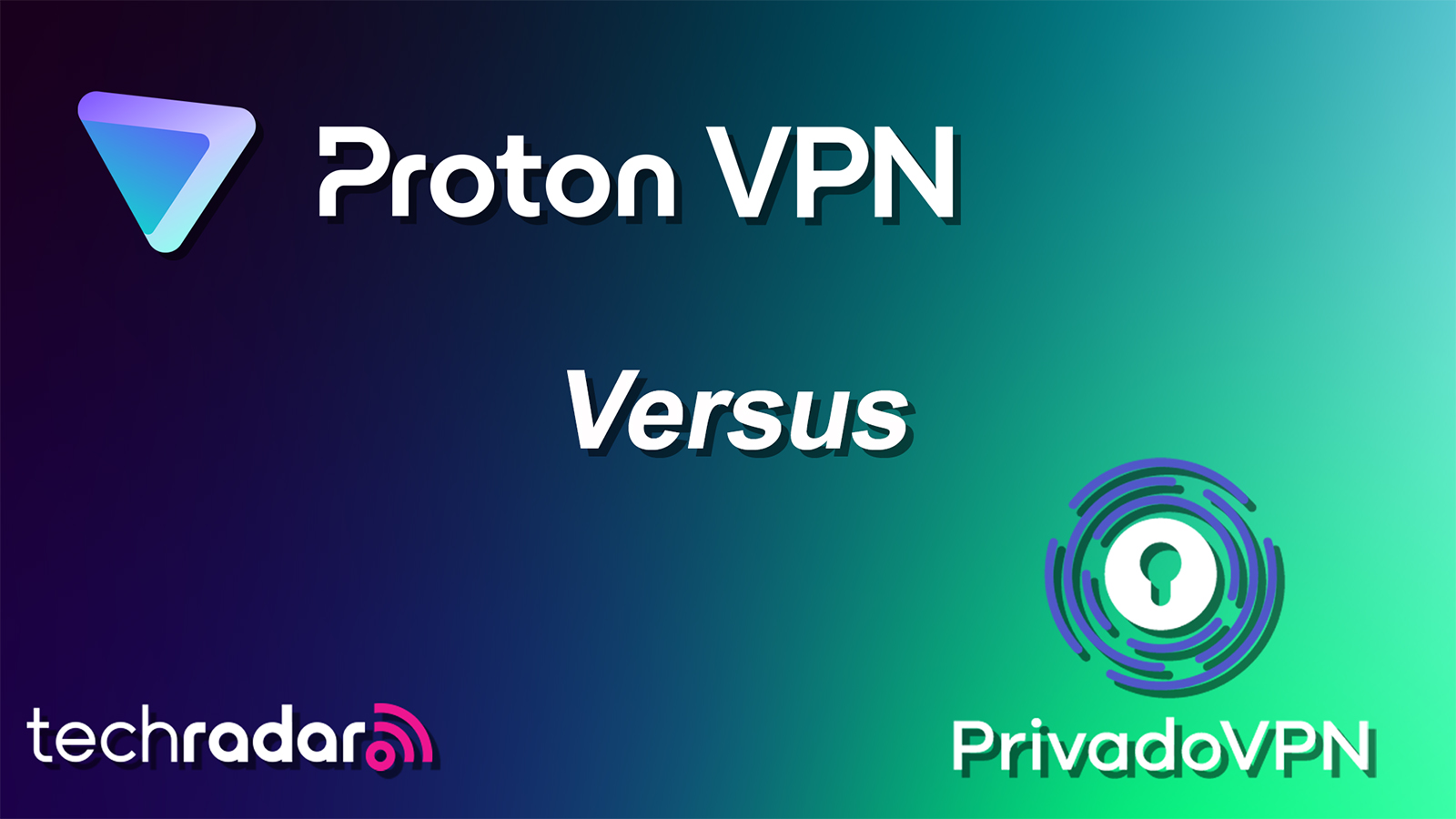
VPNs are the talk of the town these days, especially due to growing privacy concerns. While there are numerous VPNs to choose from, we know how challenging it can be to find one that best suits your specific requirements.
To that end, we'll compare two top-tier VPN providers: Proton VPN and Privado VPN. We'll take a closer look at some of the key areas for both to make your decision of choosing the best VPN for your needs (and budget) more straightforward. Let's begin!
Proton VPN vs PrivadoVPN: specs
| Lowest monthly cost | ProtonVPN: $4.49 | PrivadoVPN: $1.99 |
| Server countries | ProtonVPN: 90+ | PrivadoVPN: 60+ |
| Maximum simultaneous connections | ProtonVPN: 10 | PrivadoVPN: 10 |
| Money back guarantee | ProtonVPN: 30 days | PrivadoVPN: 30 days |
Installing either of these VPN apps is straightforward, and only takes a few moments. The apps themselves are intuitive and easy to navigate, with most of their features right at your fingertips.
On the one hand, ProtonVPN's map interface shows server locations dotted around the world, with a traditional server list located on the left-hand side.
On the other hand, PrivadoVPN's interface does not provide a map, and focuses solely on the list of countries, with a drop-down menu for each country, revealing a list of cities where servers are available.
Usability-wise, ProtonVPN's map is clickable, allowing you to manually choose your preferred connection, making it a particularly nice touch. It’s worth noting that Proton’s server count and geographical dispersion tips the scales in its favor over Privado ever so slightly. Regardless, the price difference balances things out, which is a significant factor for countless privacy-conscious users.
Ultimately, both providers allow up to 10 devices to be connected simultaneously, which is perfect if you're looking to stay protected across your PlayStation, Xbox, and a couple of PCs and phones. Throw a smart TV into the mix, and you’ll have comprehensive protection with just one subscription.
Plans, pricing and trials
ProtonVPN starts at $9.99 for its one-month plan, and its one-year plan comes in at $4.99 per month. PrivadoVPN's prices range from $10.99 per month to $2.99 per year. If cost is a deciding factor, it's evident you'd be better off with the latter option for year-round protection.
However, if you're looking to go all-in, both providers are excellent choices cost-wise. A two-year signup on ProtonVPN will set you back just $4.49 per month—a decent save compared to the one-year plan. As always, promo codes are available for the one-year and two-year plans.
PrivadoVPN's two-year plan is a real bargain, though: at $1.99 per month, you get a torrent of services (which we'll discuss in detail below). The best part is that Privado's two-year plan features three months of free usage, amounting to additional savings, and complementing a genuinely tempting offer.
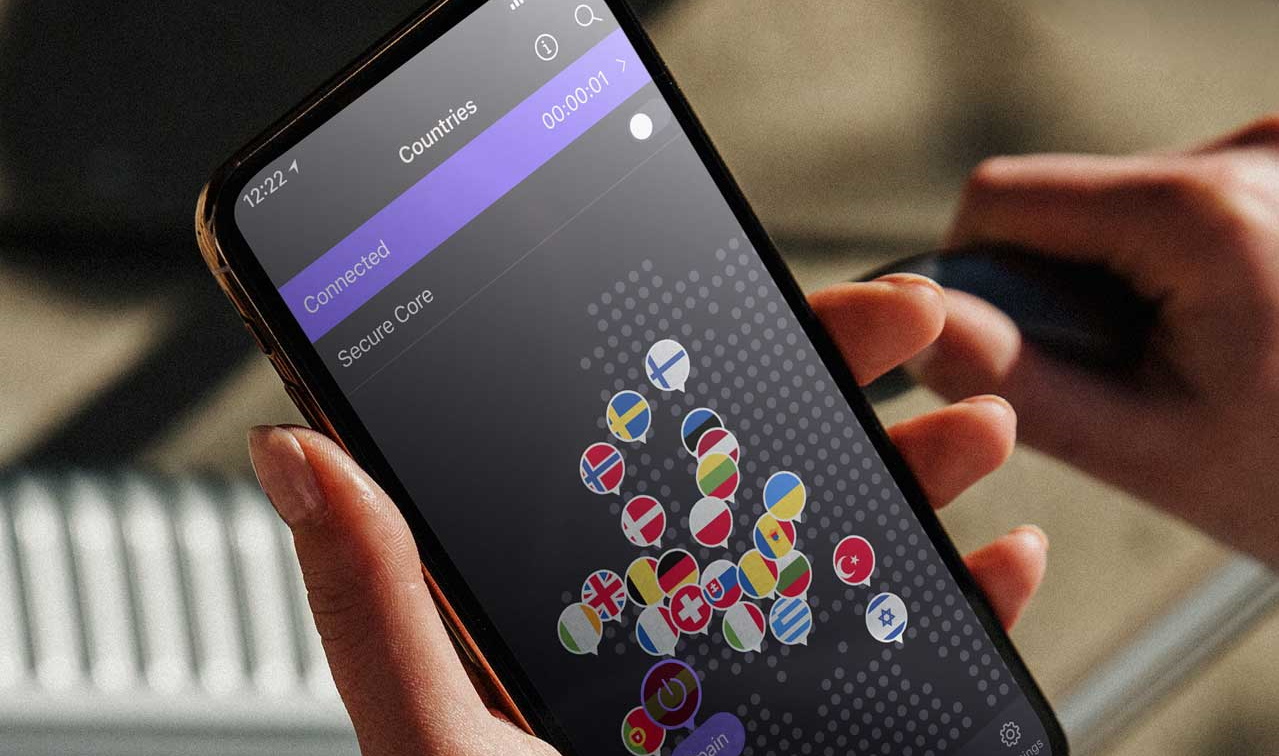
Interestingly, Proton's (relatively) new Unlimited plan offers a single subscription for all of Proton's services. This means full VPN usability, 15 secure Proton Mail email addresses, 500 GB of Proton Drive's secure storage, and end-to-end encrypted scheduling of your day with Proton Calendar. Pricing-wise, the Unlimited plan will set you back $7.99 over two years, $9.99 on the annual plan, and $12.99 billed monthly.
Even if you'll only use the storage, the Unlimited plan's two-year subscription costs just $3 more than the standard (VPN Plus) two-year plan, but it grants access to Proton's other services. For reference—One Drive Standalone by Microsoft currently stands at $1.66 annually, for only 100 GB and fewer features. If cost is not a concern, Proton Unlimited is a no-brainer.
Both apps offer some of the best free VPN services on the market.
Conversely, ProtonVPN's free plan comes with a trade-off. On the upside, it has no paltry data limits. You can use Proton VPN Free to your heart's content, but then there are the drawbacks. With the free plan, you only have access to 100+ servers in just three countries (Japan, Netherlands, and the US), it supports only "medium speeds," and covers just one device.
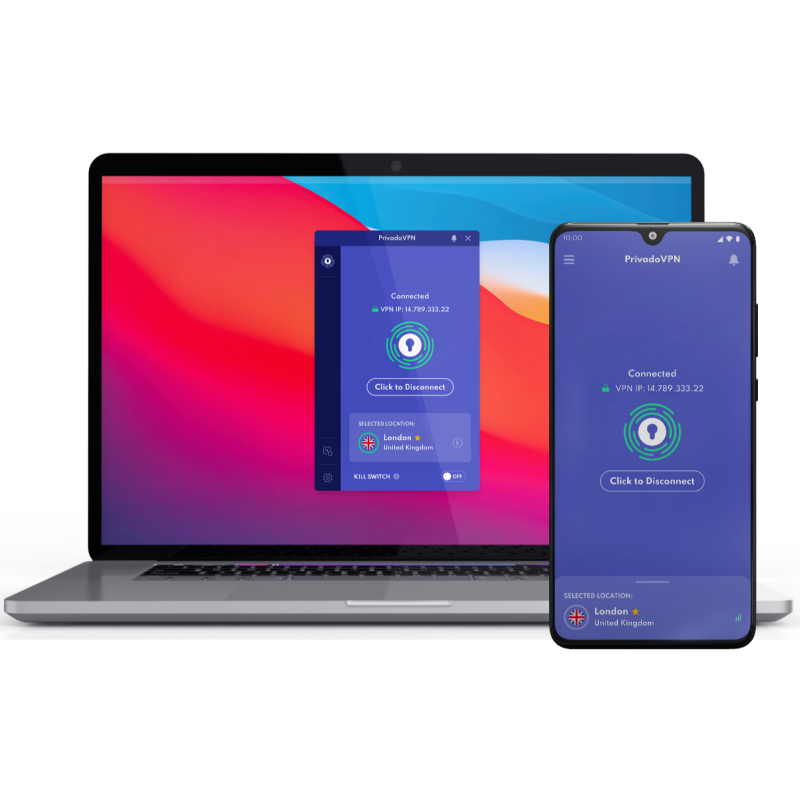
This is where PrivadoVPN takes the lead: its free option does only cover one device and drops SOCKS5, but it still supports P2P, has a maximum of 10 GB of data per month, and gives you a choice of 12 locations. This free plan combo of features not only makes Privado a more appealing choice than Proton—overall, it represents a free plan that also outperforms numerous other big names.
For instance, Avira's Phantom VPN free plan limits you to just 500 Mb per month, and Avast One's free app doesn't let you choose a location (regardless of its impressive 10 GB a week data allowance). Privado's free plan is the clear winner here in terms of sheer usability.
Then, there are the paid plans. For example, going for the monthly PrivadoVPN subscription of $10.99 translates into support for up to 10 simultaneous connections, the SOCKS5 proxy, and unlimited data. This is a pretty fair deal in my book, as most providers tend to ask between $10 and $13 for monthly-billed accounts.
As both providers have 30-day money-back guarantees, and both accept payments via card, PayPal, and even Bitcoin (with ProtonVPN also accepting cash!), we'd go with PrivadoVPN for a free plan, and Proton Unlimited's two-year subscription for the most features and value for money.
But, how do these VPN services compare when it comes to functionality?
Privacy and security
ProtonVPN offers a strong suit of security features, including 256-bit AES encryption, NetShield (a DNS filtering feature protecting users from malware, blocking ads, and preventing website trackers), VPN Accelerator, and more. Conversely, PrivadoVPN boasts features such as a kill switch, SOCKS5 Proxy, Control Tower Smart DNS, etc.
Compared to most of the competition, ProtonVPN boasts a significant privacy advantage as it's based in Switzerland. However, its competitor for the purposes of this piece (PrivadoVPN) is headquartered in the same country. Switzerland is home to immensely strong privacy laws, is outside of EU and US jurisdictions, and is not a member of the "14 eyes" surveillance network.
Logging policies
What does being headquartered in Switzerland mean for the end user? Even if PrivadoVPN is, for example, served with a court order asking for information, it's a zero-log service with nothing to hand over.
ProtonVPN is similarly user-privacy-focused. This is evident from its logging policy: "ProtonVPN is a no logs VPN service. We do not track or record your internet activity, and therefore, we are unable to disclose this information to third parties." This policy is clearly displayed on Proton's website, leaving no room for misinterpretation.
Indeed, we encountered almost non-existent session logging with ProtonVPN. If anything, the provider only stores the last successful login attempt, but this is overwritten when you next log in. As a result, the start time of your last session is the only thing ProtonVPN will know about your account use.
Independent audits seem to support our experience: ProtonVPN released the generally positive results of the SEC Consult's independent audit of its apps in January 2020. However, since three years is a long time in the VPN business, we'd like to see another, but we can wait just a bit longer. Regardless, huge kudos from us to ProtonVPN for exposing itself to this level of scrutiny.
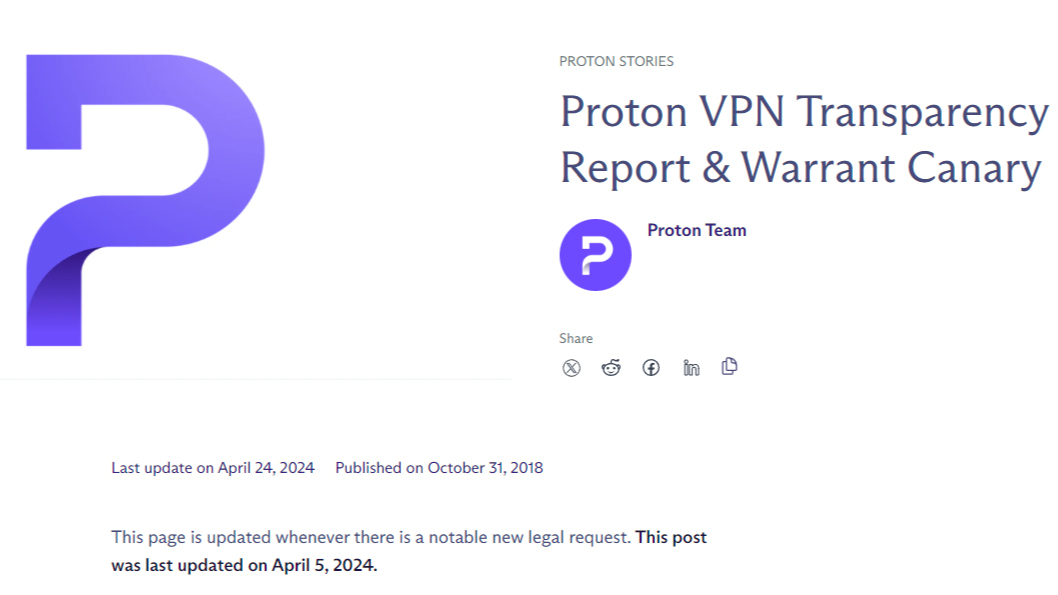
Things are a bit different with PrivadoVPN, with details on some of the information the service collects outlined in its privacy policy. Additionally, signing up for a PrivadoVPN account requires an email address. Its mobile apps access your device identifier, and, if an app fails, use crash reporting libraries to receive reports.
However, this provider has yet to put itself through logging audits. In other words, this means we have to take it at its word. It goes without saying that undertaking a third-party audit would work wonders in terms of demonstrating PrivadoVPN’s commitment to privacy and transparency.
ProtonVPN takes this one—if only for reasons of transparency.
Performance
Both VPNs performed remarkably well during our tests. ProtonVPN's latest testing round showed its speed peak at an average of over 950 Mbps for WireGuard, and well above average of 400 Mbps for OpenVPN traffic. Additionally, Proton allowed us access to content from Canadian, Aussie, UK, and US BBC iPlayer, Disney Plus, Amazon Prime Video, and Netflix.
One thing worth mentioning is that ProtonVPN does not offer unblocking reliability to both premium and free users—something that PrivadoVPN does.
Overall, with Proton, you have at your disposal a full security suite as part of your VPN experience: cloud storage tools, secure email, password manager, and even a calendar. These are available for a fraction of the cost of the competition.
When it comes to PrivadoVPN's performance, our latest round of testing showed a similar performance to that of ProtonVPN: a 950 Mbps download speed, making it one of the fastest VPNs available. This translates to seamless torrenting, gaming online, and streaming in 4K without a hitch. However, while it reliably unblocked Amazon Prime, BBC iPlayer, and US Netflix in our tests, PrivadoVPN still came up short compared to NordVPN or ExpressVPN.
Regardless, PrivadoVPN offers fantastic speeds and little to no server congestion. Considering that this provider offers both a paid and free VPN experience—with the latter being the standout performer in comparison—you should have no issues whatsoever in terms of performance even on free servers.
Streaming
Accessing geo-locked streaming services is one of the most significant use-cases for VPNs. When it comes to accessing content in other countries, there's a constant battle between streaming providers and VPNs. While some consider VPN performance to be a deciding factor when choosing the best VPN, others see streaming as the deal-breaker.
During our tests, ProtonVPN ensured largely unobstructed access to US, UK, Aussie, and Canadian BBC iPlayer, Disney Plus, Amazon Prime Video, and Netflix, making it an impressive service to consider.
PrivadoVPN performed admirably, but despite its continued service improvements and a full-fledged dedicated geo-unblocking team, we felt it has yet to be welcomed into the big leagues alongside Proton, Nord, and Express VPN services.
ProtonVPN takes the win in this segment (by a hair's breadth, though).
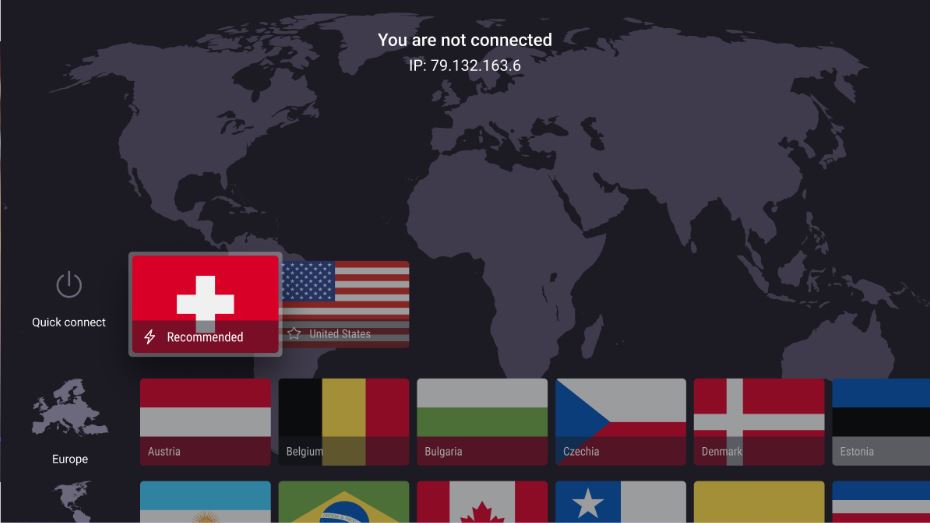
Torrenting
It's important to note that torrenting is not available with the free version of ProtonVPN, as it does not support P2P traffic at all. The premium version though is a reliable service, with all the bells and whistles mentioned above: a strong commitment to transparency, a privacy-friendly logging policy, and excellent speed.
Proton has P2P-optimized servers in over 85 countries (covering 93% of Proton VPN's server network), and BitTorrent traffic is allowed on all servers. The only countries without a P2P-optimized Proton VPN server include Russia, Nigeria, Moldova, Norway, Myanmar, and Ireland.
You also have access to a port forwarding feature, and a kill switch to protect against connection outages. During our tests, Proton VPN's premium version had an average local bitrate of 9.7 MiB/s.
Conversely, PrivadoVPN offers P2P file sharing across its product range, including its free servers. During our tests, the service showed a decent average download bitrate of 7.9 MiB/s, and premium Privado VPN users can access a SOCKS5 proxy on every server.
On the downside, this feature is not available on the free servers, and port forwarding is not allowed at all, meaning you may not be able to seed files for fellow torrenters.
Another segment in which ProtonVPN takes the trophy. Good effort on PrivadoVPN's side regardless.
Mobile apps
One of the biggest concerns when wanting to use a public Wi-Fi hotspot is staying safe. This goes double for those who like to frequently use public transport or work in cafes. Consequently, every VPN's essential features are easy-to-use, reliable, and secure mobile apps.
When it comes to Android users, ProtonVPN's app makes superb use of smartphone real estate regardless of the model and screen size. Both landscape and portrait modes do a smashing job of reproducing the desktop app interface, which is glorious to look at and use by default.
Things become even better on the iOS app, which adds visual wizardry to the interface. For example, instead of plain markers on the map, colorful flags represent server locations. Annoyingly, however, the app persists on organizing servers by state rather than cities (which we'd love to have as a configurable option).
Features are almost identical across both Android and iOS apps, with the latter boasting iOS widgets to view the logs and diagnose any connection issues, check battery usage, and connect/disconnect. A breath of fresh air, in our book.
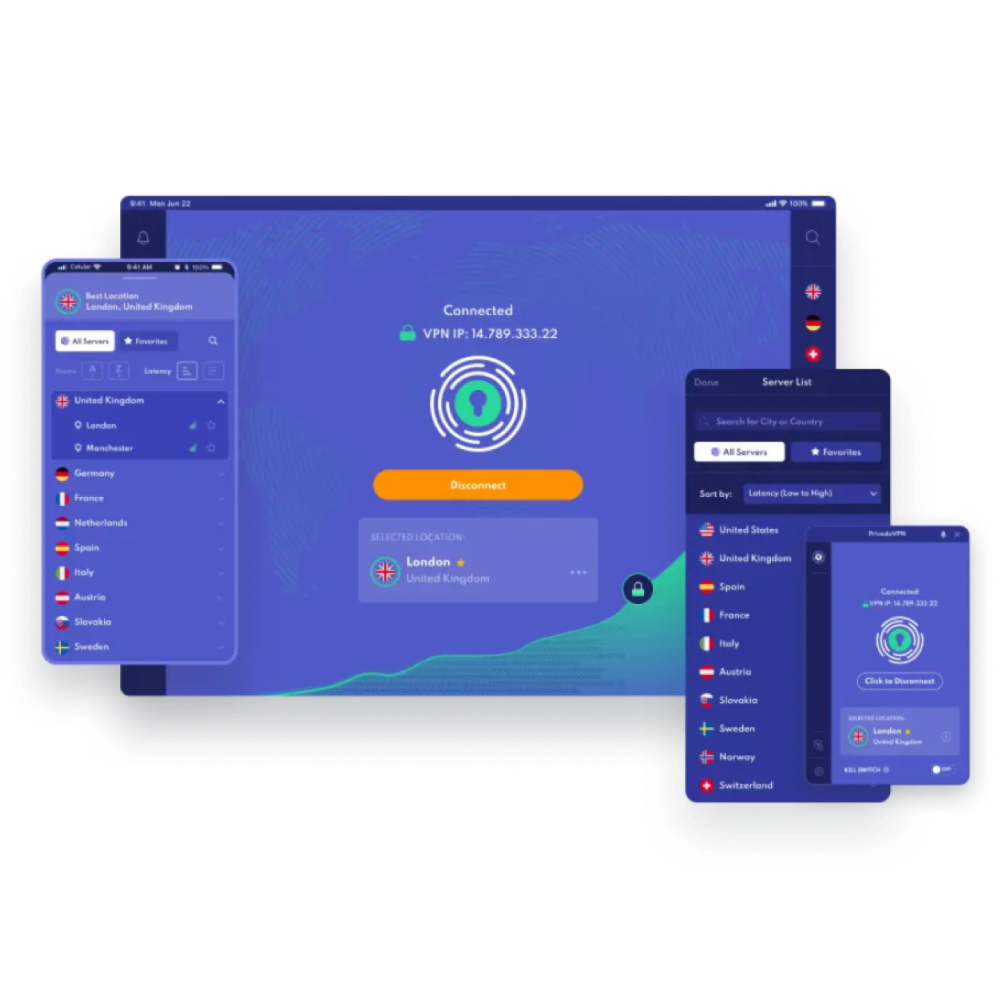
Over on the Privado VPN side of things, both Android and iOS apps generally check all the necessary boxes. They just work. For instance, the iOS PrivadoVPN app offers the functionality of swiping up to display the location list. Also, it supports IKEv2, OpenVPN, and WireGuard connections, which work reliably and quickly in most cases.
On the downside, Favorites are not supported in the iOS app, and there's also no kill switch. Add the relatively limited auto-connect option (you can't choose the type of location, but can set it up to connect when the app starts), and you're left with a so-so experience. It works, but has so much potential to be more user-friendly.
The current PrivadoVPN Android app seems to fill in the blanks left by its iOS counterpart. For instance, hit "Connect," and you're protected, not to mention instant access to the full location list when you want to change servers. And then there's the feature toolbox at your fingertips, with split tunneling, IKEv2 protocol support, OpenVPN, WireGuard, and a kill switch waiting for your command.
Support
ProtonVPN has live chat support, but you'll only be able to visit this conversation street during business hours: 9 am to 5 pm CET. During our test, the agent was professional and friendly, listening to our questions and paying attention to our responses. They then asked sensible and reasonable questions of their own, offered effective advice, and pointed us to online resources where we could get additional assistance.
Equally impressive was the agent's offer to convert our chat into a support ticket. The idea was that, if their suggestions didn't help, we could carry on the conversation at a later point without having to go through describing the entirety of the problem again from scratch. Points for such a proactive approach.
Should live chat not be your cup of tea, you can always send an email or raise a ticket manually. Replies can take a while—up to several business days in some cases—but, in our experience, the responses are generally very helpful. They did an excellent job of pointing us in the right direction.
PrivadoVPN also has live chat, with the experience relatively similar as with ProtonVPN. You can also raise a ticket directly, and expect a reply within a several-day time frame. Should urgent issues arise, we recommend opting for live chat, as it's the quickest and most efficient method of sorting things out.
Another close call, but we have to go with ProtonVPN's support for this go-around. We were truly impressed by the agent's willingness to go above and beyond for a customer.
How do we test VPNs?
Everyone has their own view on what's important, and what really isn't when reviewing a VPN service.
Here at TechRadar, we feel it's important to know which VPNs live up to the claims they make in their adverts, which ones are really worth your time, and which ones you should avoid.
While definitive verdicts are hard to find, our approach is based on covering as many different aspects of the service as we can, and telling you more about them. This way, we aim to cover enough ground to give you a feel for what a provider is really like.
We begin the process by collecting details on the service and its features by visiting its website. In doing so, we do our best to avoid being blinded by overselling, and instead, focus on transparency and honesty as the key features of every provider.
We then observe critical aspects like privacy, logging, security audits, performance, unblocking, apps, support, and anything else that may be relevant for an end user's final decision. However, we exert equal caution and prudence in going through each service's privacy policy, aiming to ensure there are no sneaky gotchas prowling from the Terms of Service.
The ultimate goal of all our testing is to confirm that you actually get everything the provider is claiming you are, and that you can trust it not only with your information and data, but also your wallet.
Proton VPN vs PrivadoVPN – Which is better?
So, which is better? Both ProtonVPN and PrivadoVPN shine among the competition for numerous features. They each have their own unique ways of ensuring privacy to users, but it really comes down to what you unequivocally want to get from a VPN.
If you're looking for an open-source, transparent, independently audited, and overall top-tier service, ProtonVPN will undoubtedly serve you well. The pricing isn't ideal, but you do get a lot of bang for your buck. If you can live with the price tag, and want to benefit from a Swiss-based VPN provider, then ProtonVPN is the obvious choice.
On the other hand, if you want to feel like you're a savvy VPN shopper while saving a few bucks, PrivadoVPN offers more than decent value for money. You'll get plenty of features—some available even with the free plan—and peace of mind with an upper-mid-class VPN solution.
We have no issues with recommending either one. However, if you're still looking for white-glove treatment and a no-holds-barred approach to your online privacy and security, check out our Surfshark review or NordVPN review to get into all the nooks and crannies of what more each has to offer.
Sign up to the TechRadar Pro newsletter to get all the top news, opinion, features and guidance your business needs to succeed!

The (cyber) devil is in the details - a saying that Alex firmly believes in every time he powers up his PC. As a freelance writer, Alex explored a plethora of topics and industries during his 10+ years-long career. Cybersecurity is his current focus, allowing his innate attention to detail (and OCD) to adorn each reader- and value-oriented piece he crafts.